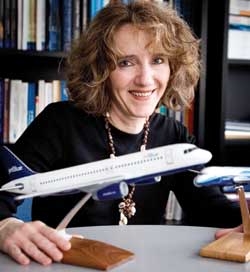Aviation takes off

Isabelle Dostaler knows that airport security is becoming increasingly big business.
photo by andrew dobrowolskyj
While Isabelle Dostaler is the director of JMSB’s Aviation (and Executive) MBA program, she’s quick to point out that Concordia’s expertise in the area is incredibly broad.
“Across JMSB, Engineering, and Arts and Science, there are many people working in the field.” When they kept running into each other at conferences (“Other people call us the Concordia mafia.”), they decided to come together and form Aviation and Aerospace Concordia.
“It’s really a ground-up initiative by professors to encourage exchange of ideas and collaborative work,” she said. Last year, its first, the group organized a multidisciplinary speaker series. “Together, we’re also trying to build and market the Concordia brand in aviation.”
Despite ongoing airline difficulties in the wake the 9/11, the aviation and aerospace industry is growing again, particularly in Quebec. “There’s more to the sector than Bombardier,” said Dostaler, pointing out that many small- and medium-sized companies play a significant role in the supply chain.
“We’re talking about travel agents, food suppliers, and parts manufacturers, as well as fuel delivery specialists and security companies. As a group, we want to support them and their needs.”
Security is a hot topic in the industry, and Dostaler wants to be clear. “In aviation, security isn’t about mechanical safety. It’s about preventing hijackings and terrorist attacks.” That’s why last year the Canadian Air Transport Security Authority (CATSA) approached Concordia about creating a 30-credit Certificate in Management and Aviation Security.
The undergraduate certificate was jointly developed by JMSB and the Faculty of Arts and Science. Delivered to CATSA employees at a location in Ottawa, the certificate is self-financing. Two cohorts of 20 to 25 students will each undertake course work over a two-year period. The first cohort began in March of this year. When complete in 2009, it is expected that the certificate will be offered online.
Dostaler believes that CATSA is a very good partner for the university. The Authority, which is responsible for security at all Canadian airports, was Transport Canada’s response to heightened security requirements after 9/11. “They are a key player in security research, and one we hope to have an ongoing relationship with,” she said.
Where the new certificate program supports aviation industry workers at the beginning of their careers, Dostaler said the masters program is for those with more experience.
Over the last year, the program has been consolidated so that it is now offered completely at a distance, a significant improvement, in Dostaler’s view. “We found the distance format was much better for the students we are serving. These are people with established careers who are on their way up, and want to keep working.”
With 23 students currently in the program (11 in year one and 12 in year two), Dostaler’s goal is to expand it to 20 per year over the next 12 months. As a private program in which fees are completely covered by students (or their firms), Dostaler acknowledged that the Aviation MBA needs at least 13 students to be profitable, but that the program is growing, particularly through francophone media exposure.
“One of our current students manages Hydro-Quebec’s fleet of aircraft. She came to us after I did a radio interview in French. She didn’t know such a program existed at Concordia before that.”
Dostaler would also like to explore a more traditional-format joint MBA program with the Faculty and of Engineering and Computer Science that would integrate advanced management courses with existing MEng or MSc requirements. Given how many engineers end up in high-level management positions, she said, the idea just makes sense.